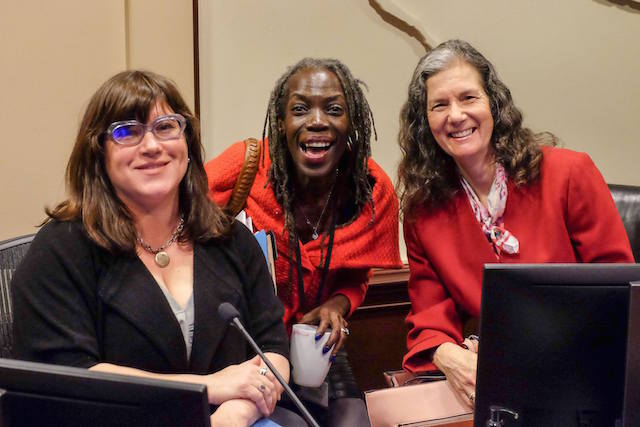
Story by Pete Shaw
Thanks to Commissioners Jo Ann Hardesty, Amanda Fritz, and Chloe Eudaly, the Portland City Council voted on Wednesday, February 13 to remove Portland from the FBI’s Joint Terrorism Task Force (JTTF). The 3-2 decision marks the second time Portland has decided the risks of using its police in cooperation with the JTTF posed a threat to the safety and security of the City’s citizens. The result of the vote means that the two Portland police officers currently working with the JTTF will cease cooperation within 90 days, and it makes Portland the second city after San Francisco to withdraw its police from a JTTF since the 2016 elections.
“When we talk about one Portland, a Portland where everyone is respected,” said Hardesty, “we cannot in good conscience continue our engagement with the Joint Terrorism Task Force.” A little over five weeks into her office, with the support of numerous community groups and individuals, Hardesty made good–and even better–on one of her most prominent campaign promises, bringing the issue of Portland’s participation in the JTTF before the council as early as she possibly could.
While the council’s decision was split, all five members agreed that the current model of Portland’s cooperation with the JTTF was flawed. However, unlike Commissioners Hardesty, Fritz, and Eudaly, and the near-unanimous opinion of those who provided testimony, Mayor Ted Wheeler and Commissioner Nick Fish believed that the City’s relationship with the JTTF could be reformed and should continue.
In his statement just prior to casting his vote against Hardesty’s resolution to withdraw, Wheeler stated, “I’ve been consistent in asserting that I would support the City’s withdrawal from the JTTF if given a compelling reason…. While I do believe that the majority of my colleagues are very well meaning on this issue, and that their values are sincere, I still believe it’s a mistake for us to withdraw the City of Portland from the Joint Terrorism Task Force.”
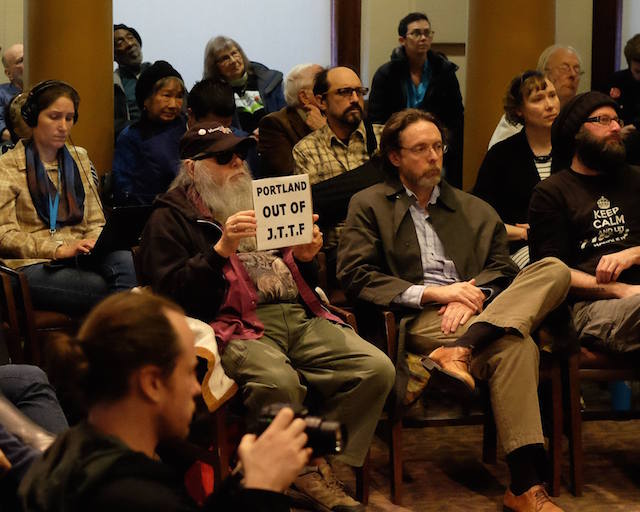
For years, Portland’s relationship with the JTTF has been tendentious. The JTTF was created in 1980 as an alliance between various federal, state, and local law enforcement agencies for the purpose of fighting terrorism. For 17 years, Portland resisted joining, and formalized its relationship with the task force in 2000, despite the concerns of numerous activist groups, a camaraderie that was only strengthened in the aftermath of the terrorist attacks of September 11, 2001.
In 2005, Mayor Tom Potter withdrew Portland from the JTTF because of its abuse of power. However, after Mohamed Osman Mohamud, a 20-year-old refugee from Somalia, was groomed as a terrorist by the FBI and was later arrested for a faux-attempt at setting off a bomb in Pioneer Square during the Christmas tree lighting ceremony in 2010, the City rejoined the task force on a case-by-case basis. In 2015, the City again fully rejoined the JTTF, providing two Portland police officers to collaborate with the task force.
The two most glaring reasons for Portland abandoning its relationship with the JTTF are related. Oregon’s laws surrounding surveillance are among the strictest in the nation. These laws forbid police from profiling and targeting people based upon a wide array of criteria including race, religion, ethnicity, and political affiliations. They are far more stringent than those to which the FBI adheres. Whereas Portland police are forbidden from surveilling an individual because they are a Muslim, the FBI might spy on an entire community of people who practice Islam or even simply fit its stereotype of some people who are Muslims.
Are the two Portland police who have been working with the FBI being used in contravention of Oregon law? Theoretically it should be easy enough to know how the JTTF is using these officers. But the FBI refuses to share that information, including with the mayor and the chief of police. As part of Portland’s agreement to rejoin the JTTF in 2015, the task force promised to provide yearly reports regarding its use of Portland’s police. At a community forum hosted last month at Unite Oregon, Kimberly McCullough, Legislative Director of the Oregon American Civil Liberties Union (ACLU), described those reports as “grossly inadequate” and “pointless.”
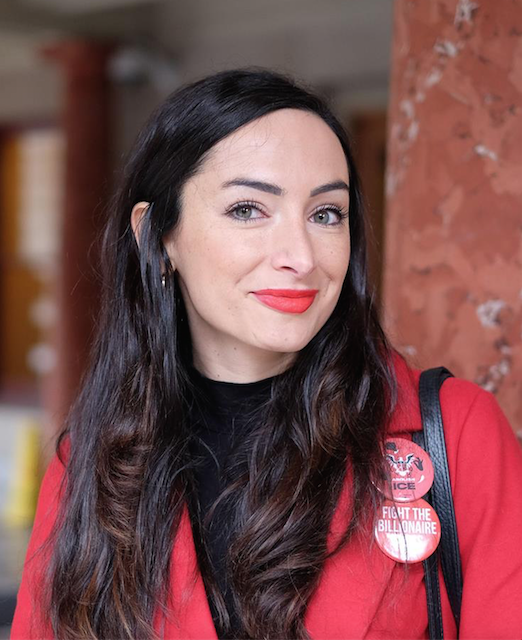
McCullough was not alone in her assessment. Prior to casting her vote, Fritz stated, “When we participated on a limited basis, the council was supposed to receive annual reports on activities of our officers. Those reports were ludicrous in the absence of meaningful information.”
The FBI has also proven inefficient in detecting terrorist attacks such as last year’s massacre at Pittsburgh’s Tree of Life synagogue (not committed by a Muslim or a stereotype of a Muslim, but by a white man) that took 11 lives; the 2013 Boston Marathon bombing; and the school shootings that horrifically have become commonplace. In the first two cases, local law enforcement was working with their local JTTF. Former FBI agent Mike German explained to the council that because the FBI leans toward dragnet surveillance, it gathers too much data to make good and timely judgments.
Using the Boston Marathon bombing as an example, German noted “the flood of information coming in through these unregulated systems that don’t use a reasonable standard. And so, in Boston for example, the FBI was warned that Tamerlan Tsarnaev may have presented a threat and did a 90-day assessment. It turned out that that was one assessment of 1,000 assessments they had done that year. So they’re doing so much work that the important details were lost. And the Boston police chief later testified that he was unaware of the warning that the FBI had received and would have done things differently had he known that information…so this is about making reasonable decisions to make sure that we are protecting all our interests.”
Historically, the FBI’s definition of “our interests” has largely revolved around upholding white supremacy. At last month’s Unite Oregon forum, Hardesty noted that since she was elected to the City council, the FBI had been making pains to let her know that most of its current work was focused on white supremacists. When Hardesty asked the forum audience if they were familiar with this policy, a murmur of dark laughter rolled across the room.
An hour before Wednesday’s council session, over 100 people gathered for a boisterous rally outside City Hall that was sponsored by about 50 activist groups representing a wide swathe of Portland organizations dedicated to greater justice. Many of them later gave testimony to the council. Of the 36 people who testified, 34 supported Portland divorcing from the JTTF. Nearly all testimony from those 34 focused on a lack of trust in the FBI, the JTTF, the Immigration and Customs Enforcement Agency (ICE, which is part of the JTTF), and the Portland police. The result was a rough sketch of a policing system that historically has spied on, discredited, and disrupted numerous religious and faith groups, and political organizations fighting for greater justice; ignored most white supremacist activities; and resisted transparency about all of it.
Millie Hobaish, the daughter of a Yemeni immigrant, was ten years old when her home was raided after many years of “very heavy surveillance.” She said her father was detained on charges that he was not allowed to know for the first portion of his trial. The family, including Hobaish’s younger siblings, were without him for a year and a half. The charges were found to be false, and Hobaish said the prosecuting attorney told her family’s lawyer that the charges “had been invented wholly to strike fear into the community and weaken bonds between individual members of the community.” While the judge dismissed the charges with prejudice, Hobaish said the actions of the JTTF had done irreparable harm.
“By that time,” said Hobaish, “the raid had destroyed my family. My father was left chronically underemployed and unable to find skilled labor. My mother is permanently traumatized. I left school at age 10. I did not return until I completed my high school diploma at PCC many years later. My young siblings were left fatherless during this time, and family and friends completely distanced themselves from us out of fear, isolating us. My family is hardly the only one. Other families in our community have had their homes raided multiple times. Family members were detained, were forced to leave Oregon, or were offered money and safety in exchange for false testimony. This story has played out many, many times in within my community to many people that I know. It has sowed a complete distrust between the Muslim community and the City of Portland.”
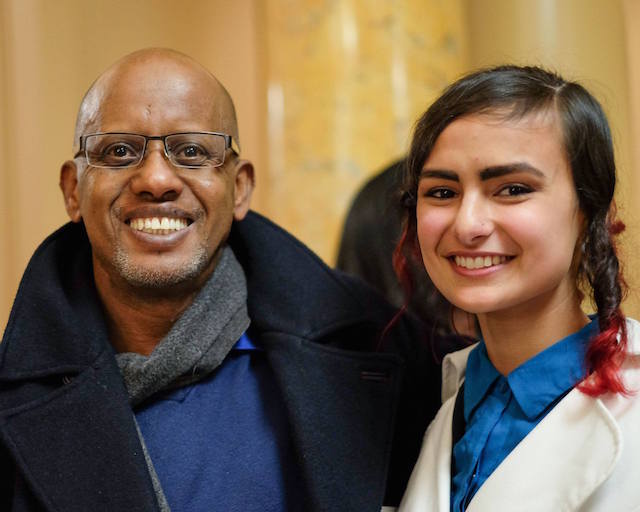
A.J. Mendoza, an organizer with Portland Jobs with Justice, noted that Portland’s cooperation with the JTTF “creates a situation where communities of color, where members of our community who are Muslim, are going to be experiencing discrimination.”
Referring to Hobaish’s testimony, Mendoza said, “It makes the pit of my stomach fall out to hear how seriously someone’s life was affected, and that alone–if that can happen even once, then we have no business being a part of this.”
The Rev. Dr. Leroy Haynes, Chairperson of the Albina Ministerial Alliance Coalition for Justice and Police Reform, stated, “I have seen and experienced how a law enforcement agency like the FBI, the Sheriff Department, and the local police have abused and misused their authority to stop the progress to expand the democratic process to include Blacks, communities of color, other oppressed groups under the banner of law and order and American Patriotism. The foot soldiers of the civil rights movement and of the post-civil rights movement have seen how these various groups have been used to block civil rights, to block voting rights, to block basic constitutional rights of citizens of our country.”
Haynes would know. He served as a member of the Southern Christian Leadership Conference and the Student Non-Violent Coordinating Committee, marched with Martin Luther King, and has been a stalwart leader in the quest for greater racial justice wherever he has stood. He reminded the council about how the FBI tried to destroy King and other Black leaders, as well as the Civil Rights Movement itself.
“History,” said Haynes, “has taught us very clearly that when law enforcement becomes politicized as was the case with the FBI and other agencies, the constitutional rights of citizens and non-citizens will be violated.”
Olivia Katbi Smith, a member of the Democratic Socialists of America and a member of the Arab community in Portland, stated, “President Trump has been clear in his bigotry against Muslims and immigrants. Internment camps overflow with children from Latin America. Even if you try to wall off ICE, policies of the JTTF are set in Washington, DC, not in Portland. The only way Portland can prevent ICE abuses is to refuse to participate in the JTTF. The FBI tells us that this task force makes our city safer. We want to know: safer for whom? It doesn’t make it safer for Muslims, immigrants, people of color, and activists who are disproportionately targeted and surveilled by this task force.”
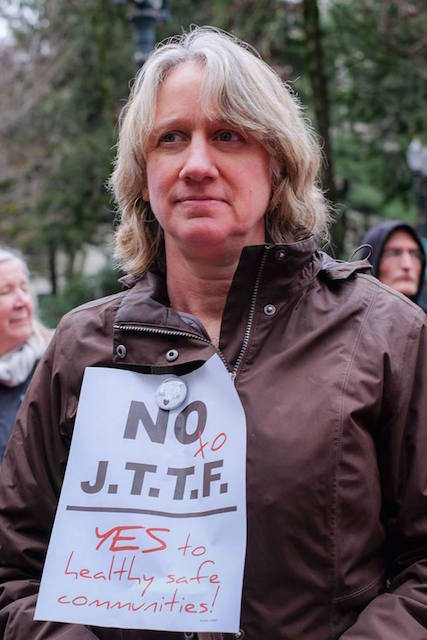
Smith was one of many, including Hardesty, who alluded to documents obtained by the Guardian showing that the FBI began surveilling the California civil rights group By Any Means Necessary (BAMN) after the group protested against neo-Nazis in 2016. According to the Guardian’s article, the FBI investigated BAMN for potential “conspiracy” against the “rights” of the “Ku Klux Klan” and white supremacists, and as well considered the Klan as victims while citing members of BAMN as potential terror threats. Those threats included BAMN’s advocacy against “rape and sexual assault” and “police brutality.”
“I would like to know,” Smith said to the council, “why we’re so eager to take the word of an abusive agency like the FBI who have sided with the KKK as victims over civil rights organizations, over the word of community members who you claim to represent.”
As Emory Mort, of Portland’s Resistance noted, the FBI and other police agencies remain committed to spying on and disrupting activist groups seeking greater justice. “Native peoples lead the fight against pipelines in Standing Rock and across the country,” Mort said. “They call themselves water protectors. To the FBI, they’re potential eco-terrorists. Black Americans unite in the street to demand justice and dignity. They call themselves, perhaps, Black Lives Matter. To federal agents, they’re Black Identity Extremists. Our neighbors here go to the border or to our local prisons, standing up to protect immigrants, refugees, children. They might call themselves Occupy ICE. Federal and local agents beg to be allowed to unleash the full force of the law on these heroes. Socialists, communists, anarchists say we all have the right to health care, houses, streets without armed militias. They stand strong as proud anti-fascists. Our chief of police goes on right wing hate radio to discuss whether these heroes too are terrorists who just need their butts kicked by our heavily militarized police. And as we all know, this is just a start to a long list of persecuted activists, organizers, and people who stand apart.”
Malcolm Chaddock of Individuals for Justice, attorney Mark Kramer, and even Commissioner Eudaly spoke of being spied on by the FBI or local police.
Chaddock, who noted he had “the dubious distinction of having had membership in two groups which have been declared to be enemies of the state by the FBI: Peace Fresno (California) and Veterans for Peace, which was on the terrorism watch list for some time.” He talked about how Peace Fresno “had an infiltrator in our midst contrary to the California constitution.” Offering a rejoinder to Wheeler’s and Fish’s desire for reform, he said, has shown “the FBI can’t be trusted to play by any sort of rules but its own.”
Over 30 years ago, Kramer had “the dubious honor of being included in the PPB Red Squad files.” Kramer said that in litigation leading to the Red Squad’s dismantling, the PPB admitted to using “paid agents, volunteer informers, and other techniques to monitor dissenters, and agreed something as trivial as trespass triggers a response.” However, Kramer was not even trespassing. He stated he was “included in the Red Squad not for terrorist or subversive activities, but for representing individuals protesting Apartheid and US supported oppression in Central America.”
Eudaly, whose closing statement was both forceful and elegant, and worth viewing in its entirety, stated that she was “connected to a group of activists who were found to be illegally surveilled by the Portland Police Bureau.”
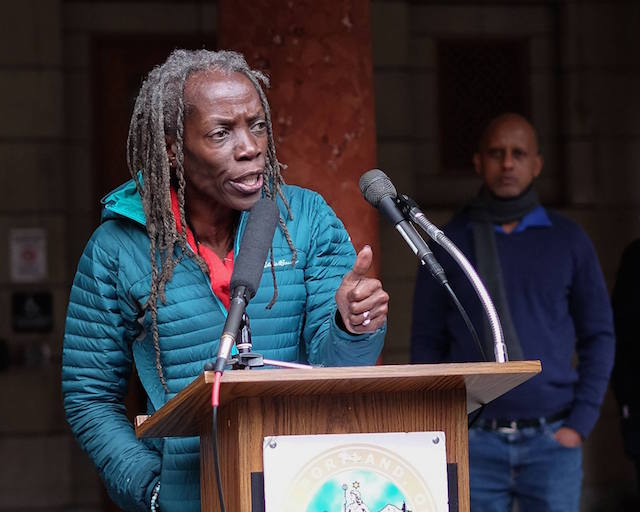
Members of the Portland NAACP, the Japanese American Citizens League, Jewish Voice For Peace, the US International Coalition for Human Rights in the Philippines, and the Asian Pacific American Network of Oregon also provided testimony in support of Portland ceasing its cooperation with the JTTF. They spoke of the history of policing in the United States and how it has affected the people and the communities these groups represent, including its effects when practiced in the service of imperialism and support of brutal regimes, such as the administration of Rodrigo Duterte in the Philippines.
Just last week, the council unanimously passed a resolution condemning white nationalism and white supremacy. Yet Wheeler and Fish support working with an organization that has been and remains a fundamental institutional pillar of white supremacy. Hardesty asked how members of the council could support a resolution proudly proclaiming opposition to white supremacy, and then support working with the FBI.
Wheeler and Fish met Hardesty’s question with platitudes. They were, despite the testimonies of thirty-four out of thirty-six citizens, adamant that they could reason with the FBI and make Portland a leader in defining how the JTTF and local police would work together in the future. The contrast between their words and those of the many who demanded Portland leave the JTTF was glaring.
Fish insisted, “The question is, Can we balance safety and security on the one hand with protecting civil liberties with the other? I believe our experience since we rejoined the JTTF in 2015 proves that we can.” However, he offered no basis for his belief.
Fish also lamented the hurried nature of the council vote. A spectator unfamiliar with the history of the FBI, the JTTF, and the Portland police would be forgiven for thinking the council had moved to fast.
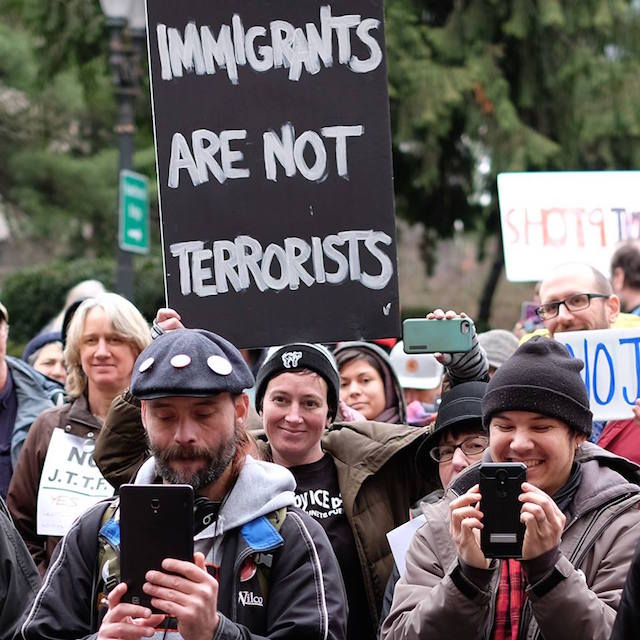
Hardesty was having none of it. “I reject the notion that this vote is somehow rushed,” she said firmly. “Since the day that we rejoined the Joint Terrorism Task Force in 2015, 50 organizations have been working non-stop to make sure that Portlanders felt safe and secure in their local community.”
The City Council meeting offered two different views of Portland. The two people who testified in support of the JTTF were, like Wheeler and Fish, white men. It is a good bet that they have not been targeted for surveillance, described as terrorists, or detained by authorities because of their religion or their skin color.
The support of Wheeler and Fish for continuing partnership with the JTTF was dismissive of the lived experiences described by the 34 citizens who begged Portland to exit the JTTF. However, due to the hard work of Portland’s many activist groups, Commissioners Eudaly, Fritz, and Hardesty voted instead to honor those lived experiences.






